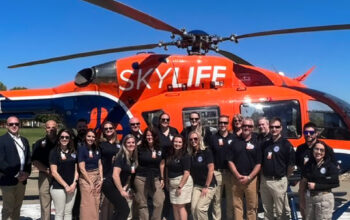The HCA Healthcare network pulls together when it matters most.
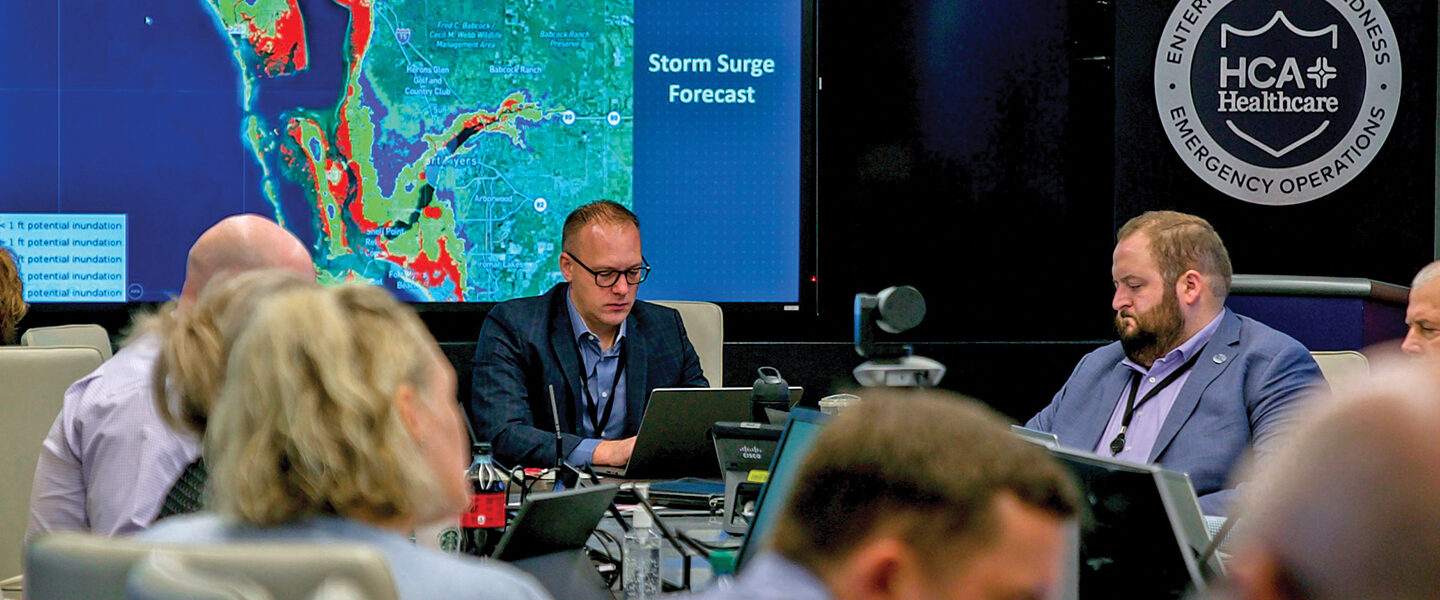
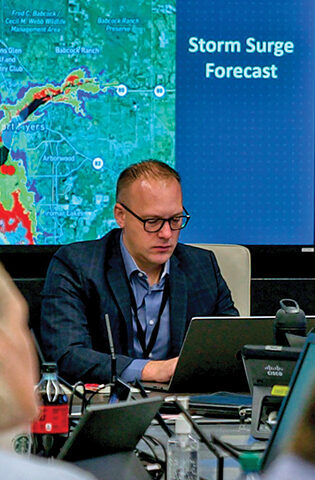
On Sept. 28, 2022, Hurricane Ian made landfall on the coast of southwestern Florida and grew into one of the five worst hurricanes in the country’s recorded history. The storm surge and winds brought flooding and damage to the region, leaving parts of Fort Myers and the surrounding area unrecognizable.
Two HCA Healthcare facilities – HCA Florida Fawcett Hospital and
HCA Florida Englewood Hospital – sat directly in the late path of the storm. Throughout the event, patients were cared for and kept safe.
In the aftermath, HCA Healthcare teams rallied to assist colleagues as everyone worked to return to normal operations.
The scale, capabilities and experience within the HCA Healthcare network enabled colleagues in the West Florida Division to confront the natural disaster with poise. The HCA Healthcare emergency preparedness team’s playbook gave each hospital clear procedures, while supplies and equipment were stocked days in advance to ensure caregivers had what was needed. Volunteers from HCA Healthcare facilities across the country arrived to assist during and after the storm.
Past Experiences Inform Future Preparations
At each HCA Healthcare facility, colleague participation plays an important role in emergency preparedness. Each location establishes two teams ready to provide the highest-quality care possible, protect patients and caregivers, maintain business continuity, and return to normal operations quickly. In the hours leading up to Hurricane Ian’s landfall, staff at Fawcett and Englewood adjusted as needed once they saw they were in the direct path of the hurricane.
“Emergency preparedness is something we work on all year long,” says Michael Ehrat, CEO, HCA Florida Fawcett Hospital. “As we move into hurricane season, we conduct refreshers on our playbook, which is regularly updated by the emergency response team at HCA Healthcare. We’re constantly learning as an organization. Every time there’s an event, such as a hurricane, we benefit from what was learned in previous experiences. Because of that, we were well prepared to handle Hurricane Ian, specifically with things like staging supplies nearby, such as ice, which was desperately needed in the storm’s aftermath and nearly impossible to get from conventional sources.”
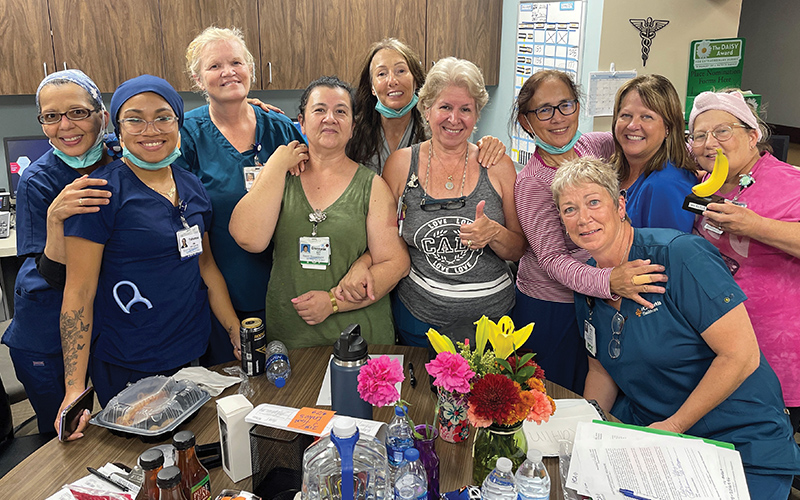
HCA Florida Fawcett Hospital caregivers often worked outside their normal assignments to ensure safe care during transfer of patients after Hurricane Ian.
Ensuring that colleagues are equipped with the resources and support they need to continue providing critical care is one of the first logistical priorities in the lead-up to a storm. Across HCA Healthcare, each department is analyzed to determine the number of staff required to shelter in place for 72 to 96 hours. Those colleagues make up a Care Team A, while caregivers on Team B relieve Team A when the time comes.
When caregiver teams arrive at the hospital, they are provided with welcome packets containing important information about things like accommodations, food, schedules and other basic needs. The leadership team also takes time to thank them for their sacrifice and commitment to serving patients and fellow colleagues.
As Ian made landfall, Englewood lost its community water supply, while Fawcett experienced significant wind damage and lost power during the height of the storm.
StormGeo updates from meteorologists allowed teams in the facilities to monitor the situation closely. They even received calls from local community leaders who didn’t have access to such resources, asking for help in keeping informed.
Expertise at every level means that no patient or process is overlooked, even in the eye of the storm. For Gina Pencic, administrative assistant at HCA Florida Fawcett Hospital, Hurricane Ian was one of many instances when the HCA Healthcare family showed up in unique and meaningful ways for those who needed them. She was one of many colleagues at both locations who stepped outside of their roles to do what was necessary for patients.
Gina observed how backup generators helped provide continued patient care and allowed them to maintain communication with their West Florida Division team.
“While we watched the path of the storm, staff notified the team that there was water coming into the building,” she recalls. “That’s when I switched over to patient-care mode, and as a trained PCT I was able to go out to the second floor to help move patients out of the wing experiencing water intrusion.”
Support in the Aftermath
Once the hurricane passed and travel was safe, the power of
HCA Healthcare’s network became immediately apparent. Volunteers from across the country — as far away as Texas and Utah — traveled to Florida, ready to help.
They began showing up as soon as the started dying down, working throughout the night so that, by morning, they could continue evacuating patients from the impacted areas.
Clinical staff assisted with moving patients. Colleagues trained in maintenance and construction immediately helped mitigate any structural damage and water leaks. Volunteers helped organize and distribute emergency resources for days and even weeks after the hurricane.
“We had caregivers who were working at Fawcett in a very stressful situation, and these volunteers provided much-needed relief,” Gina says. “I can’t even imagine the amount of time it would have taken our team to do everything without the support we received from others in the
HCA Healthcare network.”
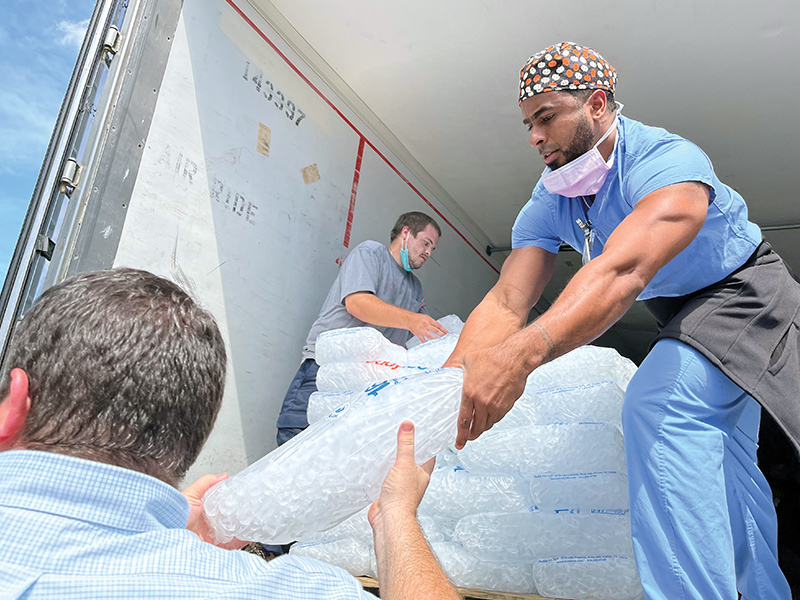
Ice trucks were one of many services on hand at our impacted facilities to make sure colleagues and members of the community had access to necessities.
In addition to the deployment of volunteers, supplies were distributed to Fawcett and Englewood as soon as roads were safe for travel. The emergency response team established tractor-trailers with laundry facilities, showers and mini-marts. Colleagues without power and water at home had access to what they needed, even gas and portable generators.
“The supplies just flowed in,” Michael says. “Things like that don’t just happen by accident; it was well-thought-out, and we benefited from the experience of others.”
From tarps to plywood, water and ice, provisions had been planned for, and teams across the enterprise were able to respond. Across the south market, HCA Healthcare distributed 80,000 pounds of ice and 20,000 cases of food, and Fawcett had 1,300 visits to their free fueling stations to gas up cars and generators.
“The supplies just flowed in,” Michael says. “Things like that don’t just happen by accident; it was well-thought-out, and we benefited from the experience of others.”
From tarps to plywood, water and ice, provisions had been planned for, and teams across the enterprise were able to respond. Across the south market, HCA Healthcare distributed 80,000 pounds of ice and 20,000 cases of food, and Fawcett had 1,300 visits to their free fueling stations to gas up cars and generators.
I can’t even imagine the amount of time it would have taken our team to do everything without the support we received from others in the HCA Healthcare network.— Gina Pencic, administrative assistant
The Hope Fund Delivers Quick Assistance
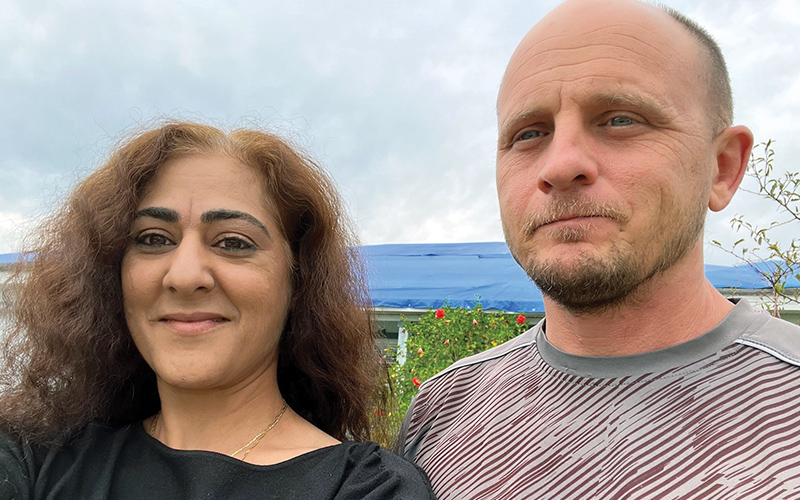
Jeremiah Chapman, a CT tech at HCA Florida Poinciana Hospital, and his wife, Mai, relied on assistance from the HCA Healthcare Hope Fund in the wake of Hurricane Ian.
Jeremiah Chapman, a CT tech, has worked at HCA Florida Poinciana Hospital since it opened in 2013. He is no stranger to hurricane staffing and served on Team A, the group of colleagues who stayed at the hospital during Hurricane Irma in 2017.
So he reported to work on the morning of Wednesday, Sept. 28, 2022, on Team A once again, while his wife, Mai, and their youngest son sheltered in place at home. As Hurricane Ian bore down on central Florida, they took shelter in a bathroom. As the weather intensified that night, they heard the wind rip the roof from their home, and the ceiling caved in. Although they survived the storm, the family was devastated by the destruction.
Jeremiah turned to his director, Sherry-Kay Bennett, who suggested he apply for assistance from the HCA Healthcare Hope Fund immediately. By the time he left the hospital at the end of that day, the money from the Hope Fund was already in his account to help begin the recovery process.
“I had heard of the Hope Fund, but I would never have thought of it had my director not printed off the forms for me,” says Jeremiah. “I couldn’t believe the funds came so quickly! This support is very helpful, and I am very appreciative to all of my HCA Healthcare colleagues who contribute to the Hope Fund each year.”
Continued Colleague Assistance
The storm’s impact continued to be felt weeks and months after Hurricane Ian’s departure.
As part of the HCA Healthcare network, colleagues at Fawcett and Englewood experienced firsthand many of the benefits available to them following a natural disaster.
In addition to the emergency supplies, other resources available included:
- Continuation of pay
- Disaster pay
- Emergency PTO cash-in
- Shelter and access to showers in the hospital
- Complementary hotel stays for individuals and families
- Over $400,000 in Hope Fund support for caregivers from Englewood & Fawcett
“I’ve always been a promoter of HCA Healthcare and the services they provide all colleagues,” says Sherri Wetherill, director of cardiopulmonary at HCA Florida Englewood Hospital. “But actually living through it really speaks volumes to how much the resources mean,”
Sherri was out of town when the hurricane made landfall but returned to Florida as soon as it was safe to do so. In a matter of days, she felt ready to return to work. Even while dealing with damage to her own home, Sherri’s heart was with those who needed her. But Sherri too was in need. When the remediation company called her at work a week later, she learned she had two days to remove all belongings from her home and her mother’s house so that repairs could begin.
“All of a sudden, I was overwhelmed with stress, worry, panic and fatigue,” she says.
At that point Sherri decided to use some of the resources she’d been telling others about. She applied for help from the Hope Fund, which allowed her to get the necessities she needed. A referral to counseling services through EAP and a leave of absence enabled Sherri to attend to personal matters.
“I’ve been able to be part of an outpatient program, a support group, which has been very educational and helped me stay focused through the weeks of reconstruction on my house,” Sherri says. “When you get to a time in your life when you need those resources, it’s just wonderful to know it’s there. I strongly encourage anyone who needs it to utilize the services provided by HCA Healthcare, and I’m able to help my own team work through the application processes better now, having done it myself.”

